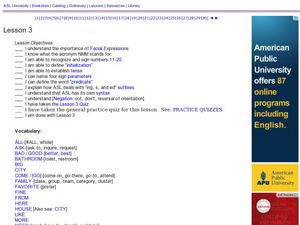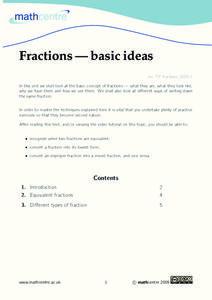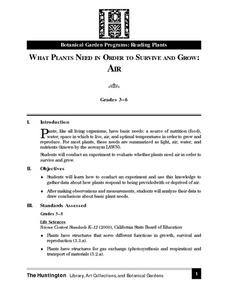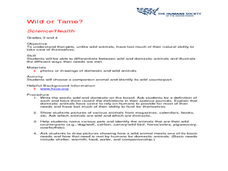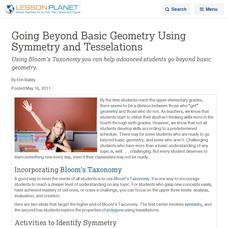Curated OER
ONES and TENS
Before you can teach place value or regroup, you need to provide students with a concrete idea of the definition of ones and tens. Here, ones and tens are defined and then shown several different ways in order to represent several...
Curated OER
Perimeter
Introduce the concepts and skills needed to find perimeter. The slide show includes the definition of perimeter, five examples, and a link to an interactive web page.
Curated OER
Two-Digit Addition
In need of a few good problems for the class to solve every morning? Each of the eight slides contain six double-digit addition problems which would be perfect as a morning math warm-up, skills and drills practice, or to be completed as...
Science Matters
Oh Heron
Two teams—the environmentalists and herons—play four rounds of the game, Oh Heron. Using hand symbols to represent food, shelter, and water, players locate their match to produce more herons while those unmatched decompose.
Curated OER
ASL: Lesson 3
The ASL lessons from lifeprint are amazing, but can be complicated. While this lesson is perfect for those needing to learn or teach ASL to the deaf community, it could also provide a valuable communication tool. This resource features...
Curated OER
When Ants Fly
Here is a great lesson on constructing line graphs. Learners identify common characteristics of birds, ants common needs of all living things. They also write a story from the perspective of an ant or a bird that has lost its home and...
EngageNY
Mid-Unit Assessment: Text-Dependent and Short Answer Questions: Excerpts from “A Limited Supply”
There's no such thing as an unlimited resource. Scholars complete a mid-unit assessment by reading A Limited
Supply. They answer text-dependent questions and complete a graphic organizer about key terms in the text.
Math Centre UK
Fractions—Basic Ideas
What are fractions? Find out using a reference page and video that goes in depth on how to make fractions equivalent, write fractions in simplest form, convert improper fractions into mixed numbers, and vice versa. Following the detailed...
Flipped Math
Unit 2 Review: Create and Solve Equations and Inequalities
Start with the basics. Pupils work through a review of the unit on equations and inequalities. Learners begin with solving equations and inequalities with no context, move on to problems that involve a context, and finish with a...
Curated OER
What Plants Need in Order to Survive and Grow: Air
Young scholars conduct an experiment to determine whether plants need air in order to survive and grow. They discuss natural resources, analyze slides, and observe and record data from the experiment.
Curated OER
What Plants Need in Order to Survive and Grow: Soil
Students conduct an experiment to evaluate whether plants need soil to survive and grow. They plant two seeds, one with soil and one without, make predictions, and record and analyze the seed germination results on a worksheet.
Curated OER
Animal Habitats
Learners research an animal and their habitat. In this animal habitat instructional activity, students observe a WebQuest that describes the different habitats: deserts, tundra, rainforest, forest, and ocean. They determine which habitat...
Curated OER
Wild or Tame?
Learners explore wild and domestic animals. In this animal lesson, students define wild and domestic. Learners are shown pictures of animals and choose if they are wild or domestic. Students name pets and name their wild counterpart....
Curated OER
What Do They Need?
Second graders engage in a lesson that covers some of the basic needs of pets. They engage in a the completion of a needs worksheet that serves as a way to organize ideas as they come up in class discussion. The needs of a pet are...
Curated OER
Show Me Economics - Families Have Needs
First graders explore the four basic needs. Through discussion, 1st graders discover that all people need food, clothing, shelter and love. They create a collage representing the four basic needs. Students sing songs about basic needs.
Curated OER
Vegetable Twister
Second graders study the changes in organisms over time. In this Life Science lesson, 2nd graders explore how living things react to changes in the environment. Students identify the basic needs of living things.
Curated OER
Special Education Fitness Challenge
Make fitness a part of each and every day. Special Ed young scholars are given charts with maps and record keeping information. They are given a 20-week period (late October to late March, when the weather is cool enough) to walk that...
Curated OER
Poetry: Basic Elements of a Poem
People who pen poetry positively need to know basic tenets and terms of poetry, like alliteration and consonance, for example. These and other terms are define and illustrated. Then viewers are given an object and asked to craft a...
Curated OER
Writing the Five Paragraph Essay: Some basic rules for writing that you should always follow!
Need a quick review of the format of the five-paragraph essay? The strength of this presentation is in the color-highlighted examples used to illustrate the terms. Consider adding additional slides that provide a model of a complete essay.
Curated OER
Swing your Partner: The Basics of Square Dancing
Learners perform square dancing steps. For this square dancing lesson, students view a video to learn the basic steps. Learners discuss the history of the dance and perform with partners.
Curated OER
Equation Basics
In this equation basics learning exercise, students solve simple algebraic equations. This one-page self-checking learning exercise may be completed on-line. If preferred, an answer sheet may be printed.
Curated OER
Logo Design Basics: School ID
Students design a new logo for their school. In this graphic design lesson, students learn the fundamentals of logo design and how to incorporate the needs of the client in design development. Students design a new school logo that...
Curated OER
Going Beyond Basic Geometry Using Symmetry and Tesselations
Using Bloom's Taxonomy you can help advanced students go beyond basic geometry.
Curated OER
Crops 2: What Plants Need to Grow
Learners explore agriculture by participating in a plant growth activity. In this botany lesson, students discuss what types of plants grow in their local environment and what the plants need to survive. Learners read assigned text about...
Other popular searches
- Basic Needs of Plants
- Basic Needs of Animals
- Basic Needs and Wants
- Basic Needs of Organisms
- Animal Basic Needs
- Basic Needs of Living Things
- Insects Basic Needs
- Basic Needs of Human
- Meeting Our Basic Needs
- Habitat Basic Needs
- Hierarchy of Basic Needs
- 5 Basic Human Needs






